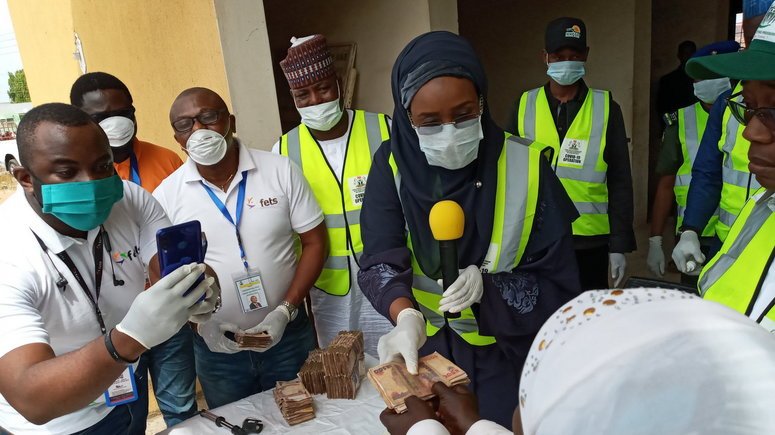Details of How to Register for Conditional Cash Transfer in Nigeria can be accessed below.
Poverty is one of the major problems Nigeria faces. With millions of Nigerians living in poverty, the government has rolled out several projects aimed at reducing poverty and socio-economic vulnerability. One such programme aimed at reducing the number of vulnerable households in Nigeria is the Conditional Cash Transfer programme. Sadly, not all needy and deserving households know how to go about registering for the Conditional Cash Transfer. Fortunately, this article intends to solve that problem by providing a detailed explanation of how to go about registering for the Conditional Cash Transfer (CCT) programme. Keep on reading to learn about the process involved in registering for the Conditional Cash Transfer programme in Nigeria.

How to register for conditional cash transfer (CCT) in Nigeria would be discussed below:
-
Visit any Designated Youth Employment and Social Support Operation (YESSO) Centre Near You
Although registration for most social welfare initiatives is done online, you can only apply for this programme in person at a designated office for Conditional Cash Transfer registration. The Youth Empowerment and Social Support Operation (YESSO) is in charge of registering eligible members of the population for Conditional Cash Transfer so representatives of YESSO man registration centres for CCT across Nigeria. Therefore, the first step is to look for the nearest YESSO-manned CCT registration centre around you.
-
Register for the Conditional Cash Transfer Programme with the YESSO Representative
After you might have found the nearest CCT registration centre around you, the next line of action is to register with the Youth Employment and Social Support Operation (YESSO) representative. During your registration process, you will be required to provide personal information about yourself such as your name, and state of origin, among other things. In addition to providing important details about yourself, the YESSO agent in charge of the registration process would capture your face for future use and your identification card should you be among the successfully shortlisted applicants. You must provide accurate details during the registration process to improve your chances of being among the successful applicants.
-
YESSO Representatives Compiles List of Applicants that Meet all the Requirements
Although poor and vulnerable households are eligible to benefit from Conditional Cash Transfer, the YESSO agents have to compile a list of applicants who fall below the proxy means test, that is those deemed to be needy and deserving among the submitted names. The YESSO agents work with laid-down criteria determined by the government and the concerned ministry to compile the most deserving from the submitted names. The compiled names of applicants who meet all the requirements will then be forwarded to the National Cash Transfer Office (NCTO) for the next stage of the process.
-
Confirmation of Compiled List by the National Cash Transfer Office (NCTO)
After the National Cash Transfer Office (NCTO) has received the compiled list of applicants that meet all the requirements from the YESSO agents, the NCTO goes through the list again to confirm that the names submitted meet the criteria for being beneficiaries of Conditional Cash Transfer. After further confirmation has been completed, the NCTO will send the list back to the YESSO agents so it will be posted at designated open points in the community where people that applied can check to see if they were chosen as beneficiaries or not.
-
Get Your Identification Card
If you saw your name among the list sent back from the National Cash Transfer Office (NCTO) to the YESSO agents where you registered, it means you are among the successful applicants chosen to benefit from the programme. The last stage of the process is collecting your identity card which your picture captured during the registration process would be affixed to it. It is only with this ID card you can present to the NCTO or government representatives to get the monthly stipends of the CCT programme.
-
Which Households in Nigeria are Eligible for Conditional Cash Transfer?
The category of the Nigerian citizenry eligible to apply and benefit from the Conditional Cash Transfer programme are those that are identified as poor and vulnerable. The criteria for selecting the households eligible for this programme is designed by the National Social Security. This includes the unbanked and the poorest of the poor such that parents find it hard to feed their kids, send them to school and provide the necessary amenities. The vulnerable and poor households from the states of the federation are entitled to apply and benefit from this social welfare initiative.
-
What do Beneficiaries Benefit from Conditional Cash Transfer?
Successful applicants of the CCT programme benefit from two categories of cash transfers, namely conditional cash transfer and top-up transfers. The conditional cash transfer category of the CCT supports the poor and vulnerable with a monthly stipend of NGN5,000 to help improve their household consumption to prevent them from slipping further into poverty, as well as build resilience to withstand shock. On the other hand, in the top-up transfer category of the CCT, beneficiaries upon fulfilment of certain requirements receive capacity building in life skills and entrepreneurial skills, including encouraging the formation of saving groups and mentorship support to boost their economic status and income.
-
Which Government Agency is in Charge of the Conditional Cash Transfer Programme?
The CCT programme is a component of the National Social Safety Net Project (NSSNP) of the Ministry of Humanitarian Affairs, Disaster Management and Social Development, and is supported by the World Bank to help reduce the number of vulnerable persons within Nigeria. According to the NSSNP, about 11 million households comprising 46 million people have benefited from the Conditional Cash Programme since its inception.






















